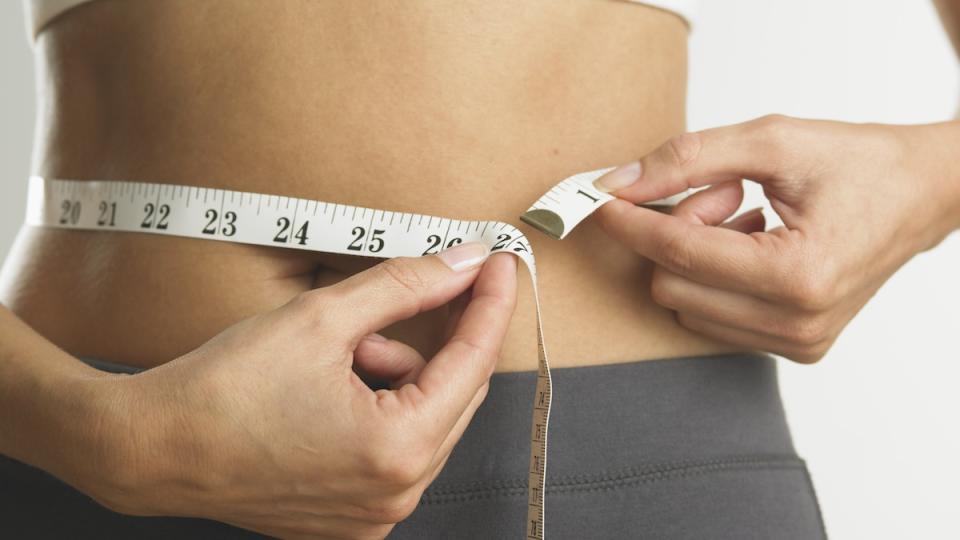The Atkins Diet: Behind the Staple Weight Loss Plan
- Oops!Something went wrong.Please try again later.
Since the 1960s, the Atkins Diet has been a popular weight loss solution. The low-carbohydrate eating plan created by Dr. Robert C. Atkins was supposedly one of the first diets of its kind in the low carb movement.
“The idea is to burn body fat instead of carbohydrates for energy, resulting in a shift in metabolism,” Gabi Meltzer, RD, tells Woman’s World. “The Atkins diet claims that you won't feel deprived or hungry on this diet. The initial weight loss on a low carbohydrate diet may be quicker [than on other diets].”
But what is the Atkins diet, and how does it work? Are there risks, and is it dietitian recommended? We talked to diet experts gave us the truth about what to expect, both good and bad.
The Atkins Diet Is Divided Into “Phases”

d3sign/Getty Images
The Atkins Diet is a low-carbohydrate diet that — similar to the Keto diet — reduces carbohydrate intake. In turn, dieters lose water weight, and eventually, fat. According to The Mayo Clinic, there are four phases to the diet; the first includes mostly proteins with about 20 grams of carbohydrates (mainly vegetables).
As the phases proceed, dieters incorporate more carbohydrates back into their diets. Once the dieter has reached their goal weight, they can work on "maintenance." This refers to sticking to a new, less restrictive healthy diet that won't make them gain additional weight.
"The Atkins Diet is structured into phases to gradually transition individuals into a state of ketosis, where the body primarily burns fat for fuel instead of carbohydrates," Chrissy Barth, MS, RDN of Epic Biology in Phoenix, Arizona, tells Woman's World. "Each phase is designed to optimize weight loss while maintaining overall health and wellness."
Related: The Keto Diet Explained: Is the Popular Weight Loss Regimen Effective?
Reports on How Dieters Feel Day-To-Day Are Somewhat Mixed

LaylaBird/Getty Images
While some report a boost of energy, thanks to ditching carbohydrates, others have not been so lucky. According to WebMD, dieters often report dizziness, constipation, headaches and other symptoms resulting from the strict, almost entirely sugar-free diet.
That said, it’s crucial for those abiding by the Atkins diet to monitor how they feel, to determine if it’s truly right for them. This will also help them when moving forward after the diet has been completed.
"People's experiences on the Atkins Diet can vary widely depending on factors such as their individual metabolism, adherence to the diet, and overall health status," Barth explains. "While some individuals may experience positive effects such as increased energy, reduced hunger, and weight loss, others may find it challenging with little or no success."
The Atkins Diet Has Shown Some Positive Short-Term Benefits

Tetra Images/Getty Images
Atkins has both positive and negative impacts on the body. According to the National Library of Medicine, dieters have experienced lower BMI, weight loss and lowered blood sugar — particularly among obesity patients.
According to Chrissy Barth, major Atkins pros and cons include:
Rapid initial weight loss due to water weight reduction from carb restriction.
Reduced cravings and hunger due to high-fat and high-protein content.
Improved blood sugar control, especially for individuals with insulin resistance.
Enhanced energy levels and mental clarity once the individual is in ketosis.
Positive changes in lipid profiles, including increased HDL (good) cholesterol and decreased triglyceride levels.
But There Are Also Short-Term Disadvantages to the Diet
Barth adds that while the short-term weight loss may be exciting for some, there are some immediate disadvantages to adhering to the strict regimen:
Initial side effects such as fatigue, headaches and cravings during the induction phase.
Difficulty adhering to the strict carbohydrate restrictions, leading to feelings of deprivation.
Potential nutrient deficiencies if not consuming a balanced diet with sufficient vitamins and minerals.
Increased risk of constipation due to a low fiber intake from restricted carbohydrate sources.
Atkins Has Also Raised Some Eyebrows Regarding Potential Long-Term Risks
In addition to the similar short-term side effects of ketosis (smelly breath, dizziness, indigestion, and headaches), studies have also shown that following Atkins long-term could have physical repercussions. These can include joint pain, gout, kidney stones, osteoporosis, kidney dysfunction, and more.
“There is insufficient research on the long-term safety of these diets with regards to certain cancers and cardiovascular risk,” Gabi Meltzer says.
And, she adds, it’s difficult for most dieters to keep the weight off. That said, it's important to check in with oneself, to avoid yo-yo dieting, and even the development of psychological issues such as body dysmorphia and eating disorders.
Related: A Cheat Meal Can Turbocharge Your Atkins Diet
“The pursuit of quick weight loss through regimes like the Atkins Diet, along with various other fad diets, can lead to unintended consequences that may overshadow any temporary benefits,” she says.
The concept that dieting often predicts weight gain is strongly supported by research. Notably, studies indicate that one to two-thirds of dieters regain more weight than they lose within one year, with most returning to or exceeding their initial weight within five years
Gabi Meltzer
Without Carbohydrates, Atkins Isn’t Cheap
An integral aspect of most American diets is carbohydrates. So, when taken away, the average Atkins grocery haul will consist of mostly vegetables, proteins and dairy.
Experts recommend shying away from “Atkins-brand” packaged foods
Although there are ways to cut down on the budget by opting for frozen meats and veggies, and choosing eggs or tinned fish, it’s still more expensive than the average diet. But experts recommend shying away from “Atkins-brand” packaged foods, which will drive up the price of dieters’ weekly hauls, and making your own Atkins-friendly meals.
“The cost of following the Atkins diet is high since staple foods are restricted such as bread and maize meal, and more expensive protein foods and fats are promoted as the main food sources,” Meltzer said.
Atkins Requires Planning — and Less Socializing

Juergen Frank/Corbis/VCG/Getty Images
Because of the strict “phases” of the diet, those following the Atkins regime may have to bring their own low-carb food to functions, and not eat at restaurants or socialize as much. However, because the diet doesn’t solely focus on being in ketosis (as the keto diet does), dieters may be more or less strict on how closely they follow the diet.
"Planning on the Atkins Diet involves carefully considering carbohydrate intake levels, selecting appropriate foods such as protein sources, healthy fats, and non-starchy vegetables, and creating balanced meals within one’s daily carbohydrate goals," Barth explains. "In addition, reading labels, staying hydrated, and tracking progress is important to ensure adherence to the diet's principles and goals."
Those unpleasant side effects also often cause dieters’ energy levels to tank, which could make the day-to-day and overall quality of life less enjoyable. In the end, it depends on the person.
The Carbohydrate Restriction Makes Atkins Difficult
Because of the restrictions, Atkins is not allergy- or restriction-friendly.
The Atkins Diet may pose challenges for individuals with allergies, aversions, or dietary restrictions due to its limitations on certain food groups, particularly carbohydrates... While flexibility exists within the diet's framework, careful planning and creativity may be necessary to accommodate specific needs. It's encouraged that individuals with medical conditions consult with their healthcare professional before starting the diet.
Chrissy Barth
The Atkins Diet Isn't For Everyone
Many have seen positive results from the Atkins diet, though it's considered to be highly restrictive. It also put dieters at risk of symptoms that often come with low-carb diets. Although many dietitians feel it isn't a long-term answer, it certainly promotes immediate weight loss.
FAQs
How long does the Atkins diet take to work?
Those adhering to the Atkins diet may see weight loss results in up to a week. But long-term, it may not have lasting results.
How long should someone adhere to the Atkins diet?
Dieters should speak to their doctor before starting the diet, and what the appropriate amount of time would be for them to follow the diet.
What are the risks of the Atkins diet?
Dieters may initially feel symptoms of dizziness, indigestion, headaches, and others that are associated with a low-carbohydrate diet. Some also experience weight fluctuations that come with going on and off the diet.
This content is not a substitute for professional medical advice or diagnosis. Always consult your physician before pursuing any treatment plan.

